When I had the opportunity to preview Image Comics’ new crime noir project from Infidel scribe Pornsak Pichetshote, I was immediately ecstatic. I knew I could look forward to the same degree of careful, nuanced character development and I was intrigued to see how the pacing and action would play out with the author moving into a different genre. I was not disappointed at all. Moreover, Pichetshote’s eye for incisive social commentary and gut wrenching internal conflicts remains intact. Below we discuss how the project came to be at Image Comics and why The Good Asian evolved into a personal journey of discovery reflection that seems increasingly more prescient by the day.

ComicAttack: The last time we spoke, I interviewed you and the creative team about your work on the tremendously well-received Infidel for Image Comics. What have you been working on since then?
PP: Since then, I’ve been busy working — written on a few TV shows (Light as a Feather, Two Sentence Horror Stories, a new show for HBO Max that I’m not sure if I can talk about yet), wrote a few short stories for comics, but in terms of major comics work, the majority of my energy has been spent researching and writing THE GOOD ASIAN.
CA: The Good Asian takes place during a period of particularly distressing treatment of Asian Americans and Asian immigrants in the United States. What made you realize this was a story that you had to tell? How long has The Good Asian been in development?
PP: THE GOOD ASIAN is Chinatown noir – a 1936 detective story featuring the first generation of Americans to grow up beneath an immigration ban of their own people – the Chinese. And honestly, I started researching it off and on even before I started INFIDEL in 2018. The Chinese Exclusion Act was something I discovered late in life and something I couldn’t believe I didn’t know anything about. That, coupled with my interest in the movies about Asian crime-solvers of the 1930s – Charlie Chan, Mr. Moto, and Mr. Wong – led me to want to combine those two things, and tell a story about an Asian detective that acknowledged America’s anti-Asian history.
CA: How did Image become involved with the book and how did you and Alexandre come to work together?
PP: I enjoyed working with IMAGE so much it was pretty much a no-brainer to come do THE GOOD ASIAN there. As for meeting Alex, both my editor Will Dennis and I are friends with PAPER GIRLS artist Cliff Chiang who recommended Alex to us. Cliff’s such an immense talent with immaculate taste that when he recommends someone, we were both kind of like, do we even need to look at his stuff before making him an offer? But of course, we did, and as you can see from the previews… it’s an honor. I feel so lucky to be working with him, and we’ve become such friends. Alex has such a clean, precise, yet still emotive line. He’s just an incredible draftsman, and then you add his storytelling skills, the acting of his characters, his sense of collaboration. It’s been amazing working with him.
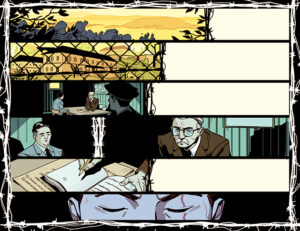
CA: What made a noir detective story appropriate for tackling this story and this time period? For those who might feel the genre is a predictable or overused lens for viewing that particular era, how would you persuade them that this take is something they haven’t seen before?
PP: I love that noir is about flawed three-dimensional protagonists trying to do what’s right for them in an apathetic world. I love that it delves into bleak worlds and outlooks. But also, with the pulp detectives I’ve been drawn to and draw from, it’s also about people trying to do the right thing despite the darkness. And in the process, their moments of selflessness, compassion, and courage seem all that much more noble and heroic. Given these current times, that feels right.
But I also wanted this book to try to touch on aspects of being Asian-American that I don’t feel I see enough of in media in general, much less comics. And when I think about those things, they almost seem to be in the contexts of questions. Are there such a thing as Asian-American themes in fiction? As an Asian-American, what are my responsibilities to myself? To my community? As an Asian-American writer, do I have unique responsibilities to myself and to my community? Are they ever in conflict? There are so many questions I attach to the topic of identity, it felt right that maybe the best character to touch upon them was a detective – a professional asker.
As for what makes this take something they haven’t seen before, I’d argue it involves a facet of history no one’s ever seen before. While shows like Warrior have explored the Chinese Exclusion Act, what the 1930s was like for the Chinese is something that’s almost never explored. I know because it was so hard to find research for it. Which is interesting because from Hammett to Polanski, Chinatown is such an iconic element of noir. So I think this will be something completely new to people unaccustomed to noir and to the people who read a lot of it, it takes an iconic facet of the genre and looks at it from a completely different point of view. From the point of view of the people usually exotified, and we say hey, it’s exotified because it’s being exploited, so why don’t we look at the entire genre from this exploited perspective and see what else we can discover through it.
CA: How were you able to construct the layers of Edison’s personality? Was it difficult crafting the nuances of Edison’s self-doubt and internal monologue and finding a way for readers to connect with his voice?
PP: Hark is a tricky character to write because he is so internal. Even with first-person narration, there’s a lot of things going on in Hark’s head that he won’t even admit to himself. So yeah, he can be tricky to write. But – and I don’t want to get too ahead of things since this will be revealed during the course of the story – but so much of how he works is dictated by his past and that gives him clear motivations through the story, despite the different ways he might be lying to himself.
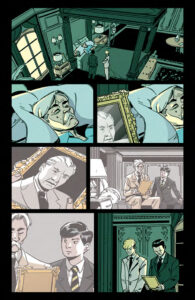
How much of an impact did his time on Angel Island have on his psyche? Did that time make it easier for him to justify ethical compromises that would come later, like a defense mechanism?
PP: As for Angel Island, he’s actually not there for that long. Probably just a week. It’s less that Angel Island changed Hark, but more Angel Island is so emblematic as to how America at the time saw the Chinese – but really all Asians – at the time.
CA: Edison has a tremendous talent for reading acquaintances and adversaries. What was the inspiration for his masterful deductive perception? How did you go about researching era-appropriate techniques and tactics? Do later issues delve more into his training as a detective?
PP: While we don’t necessarily get into Edison’s training as a detective in the series, we definitely get more into his past, and we’ll see his talent for reading acquaintances and adversaries all came from his ability to assimilate. In a way, assimilation is Edison’s real superpower, and both his knack and dedication at reading people was one of the things that led to him assimilate into society enough to prosper and become one of America’s first Asian detectives. But we’ll see Hark through the course of the series question that ability to assimilate and wonder if it came with a price.
CA: What part, if any, of Edison’s experience did you most readily identify with while developing the narrative. Did that change at all as the story progressed and you discovered more about him?
There’s a lot I relate to, honestly. I went to high school in Thailand – which are such formative years in our lives. As a result, I’ve always felt a little bit on the outside of the typical Asian-American experience. But since I only spent five years in Thailand, I don’t necessarily fit the typical Thai experience either. Edison, likewise, feels on the outside looking in, having been adopted by a white rich family. There’s a privilege he has there, and for him, he constantly feels on the outside looking in of two worlds, caught between them, trying to figure out where he belongs, and if he can be doing more to give back to people who didn’t enjoy the privilege he had.
How much time did you spend on research and what were some of your historical sources?
There were a lot of books – there’s about a dozen that sits on my desk at all times, just so I have easy access – online articles and videos, but I also took trips to Angel Island where they still have the original buildings from that era preserved as well as going to San Francisco Chinatown, where a place like the CHSA (Chinatown Historical Society of America) also keeps that history preserved. We also have a historical consultant – Grant Din – also checking my work to make sure it tracks.
CA: Did Asian communities face similar legislative obstruction and racial terrorism to what African Americans were experiencing attempting to establish thriving minority communities in early 1900s America?
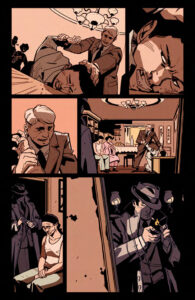
PP: I don’t know if I’m qualified to compare the African-American experience and their history to what happened with the Chinese at the time. My first instinct is to say African-Americans had it way worse, but I would say it’s been easy for Asian-Americans to relate to America’s racist history and present due to the anti-Asian sentiment they’ve seen in their lifetimes.
CA: With the persistent rhetoric from critics of the pandemic and our varied response to it referring to COVID-19 as the “China Virus”, racially motivated violence against Asian Americans, immigrants, and tourists has increased drastically. Are you hopeful that sharing the history behind The Good Asian will help encourage empathy and consideration across cultural boundaries, similar to the reception Infidel received?
PP: I can only hope it encourages empathy and gets people curious to explore the many facets of Asian-American history we don’t teach in this country. I think we’re all used to thinking the unenlightened past was less tolerant and more racist than the present. But I know I was surprised in my research at how deep America’s history of anti-Asian sentiment went. Like you say, the number of anti-Asian hate crimes have skyrocketed this past year, and I hope the acknowledgment that it didn’t come out of nowhere and in fact, has very deep roots in American history encourages people to explore more of the past.
Did you have any reservations about including racial epithets or explicitly racist dialogue from any of the characters?
PP: While I’m writing the story, I rarely have any reservations of using racial epithets and explicitly racist dialogue if it’s appropriate to the time period, as it is in THE GOOD ASIAN. I actually feel like for adult works that’s kind of important. I think the instinct to clean all that up for contemporary consumption can lead us to forget how ugly the past was, which I don’t think is helpful – and can actually be potentially destructive in its own right if we’re not careful. That said, after I’m writing the story, I always get a little nervous and then usually share it with friends just to make sure my instincts are right.
Ideally, what ideas would you like readers to take away from Edison’s story the most?
God, that’s such a hard question to answer. Probably most of all, I’d want them to feel entertained and surprised and shocked and moved – I like them to get the same excitement I get when I read a good mystery. But it would be great if they also realized how much Asian-American history we’ve don’t teach in schools and as a result, have forgotten. I hope they feel inspired to explore some more of it. Given recent events, I’ve found it eye-opening how it’s been almost a hundred years since when the book takes place, and we still don’t talk about all the blue-collar, working-class Asians in America.
As a kind of personal touch for our audience:
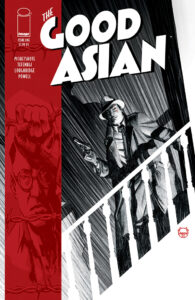
What are you reading? What are you watching? What are you listening to?
Most of the stuff I’m reading right now is peripheral research for the book, but as for what I’m watching… Right at this moment, I’m re-watching Fargo. I brought my Mom in to live with me when the pandemic started, so most of the shows we watch now, we watch together. I found out pretty quickly she doesn’t like heightened genre shows, and since there are so many episodes of Ellen’s Game of Games I can sit through, I was pretty relieved when we discovered she liked Ozark and Succession, so now we watch dark crime shows or dramas together. We’ve all found our own unique ways to pass the quarantine.
We at ComicAttack.net would like to thank Pornsak Pichetshote for taking the time to share their thoughts, experiences, and opinions with us and our readers. Check out my review of the first 3 issues here, along with an upcoming interview with artist Alexandre Tefenkgi and the more personal in-depth discussion is on the way from both creatives on the book. The Good Asian is available online and at local retailers now.
Christian Davenport
cable201@comicattack.net

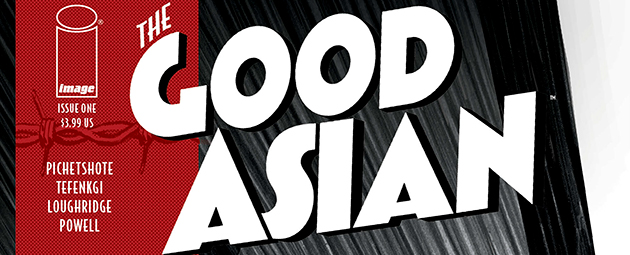
Fantastic interview Christian! Going to add this one to the list but most likely I’ll read it in trade.